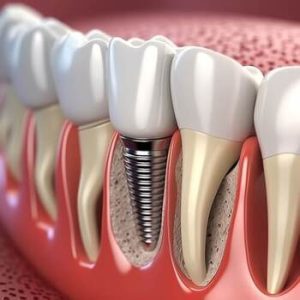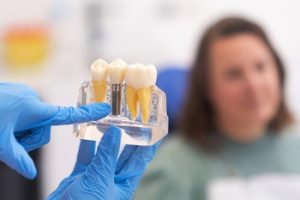When it comes to oral health, many Australians face the problem of missing or damaged teeth. A popular and effective solution is the single-tooth implant. However, navigating the specifics of a single-tooth implant cost in Australia can be daunting for many, with various factors influencing the final price. This blog will aim to demystify the process and help you understand the dental implant procedure and its associated costs.
The Procedure of Single Tooth Implant
A single dental implant, in simplest terms, is a replacement for a missing natural tooth. The surgery involves the insertion of a titanium implant into the jaw bone, so it can serve as an artificial tooth root to support a replacement tooth. For a single-tooth implant, this process is focused on just one area of the mouth, replacing one tooth.
A single-tooth implant procedure is usually carried out in stages over several months. The initial step involves a thorough assessment of the oral health condition and a detailed treatment plan. The titanium implant is then surgically placed into the jawbone during an outpatient procedure.
This is followed by a healing period, allowing the implant to integrate with the bone securely. Once the healing is complete, the crown, or artificial tooth, is attached to the implant. The result is a natural-looking, functional tooth that blends seamlessly with the surrounding teeth.
Understanding the dental implant cost involves consideration of multiple factors. It’s essential to note that the final cost can vary significantly based on these variables:
Preliminary Treatments
In some cases, additional procedures may be required before the dental implant surgery. These can include tooth extraction, bone grafting (if there is insufficient bone structure), or a sinus lift in the upper jaw. These treatments will add to the overall single-tooth implant cost.
The Implant Itself
The implant’s price, the titanium post inserted into the jawbone, will significantly influence the cost. There may be variations in the price based on the implant’s brand and quality.
The Abutment and Crown
The abutment is the connecting device between the crown and the implant, and the crown makes up the tooth’s visible part. These can be made from different materials, including ceramic and porcelain, which can also affect the cost.
The Dental Professional
The dentist’s expertise, qualifications, and reputation can impact how much dental implants cost. Highly experienced dental professionals might charge more, but their experience can ensure a smoother procedure and better outcomes.
Geographical Location
Prices can vary based on the clinic’s location. Urban areas, particularly capital cities, might have higher prices than regional ones.
Health Insurance
Dental health insurance benefits can greatly impact the out-of-pocket cost of dental implants. It’s essential to check what major dental procedures your policy covers.
Understanding the Average Starting Price of a Single Tooth Implant in Australia
Diving deeper into the topic, it’s essential to comprehend the average starting price of a single tooth implant in Australia. Though the cost varies depending on an array of factors such as the intricacy of the patient’s case, the geographical location of the dental practice, and the materials used, the price point of basic tooth extraction and the implant post placement usually serves as the starting line for the cost calculation.

Post extraction, dental implant placement occurs. This includes the cost of the titanium post, acting as an artificial tooth root, and the dental procedure itself. The cost for this part of the procedure can start from $2,000.
While this cost might seem substantial, it’s crucial to remember that it is only for implant placement. Additional costs of the abutment and the crown, along with any necessary preliminary or follow-up treatments, will add to the total single-tooth implant cost.
Every case is unique, and your needs and circumstances determine the exact cost. A comprehensive consultation with a dental professional will provide you with an estimate tailored specifically to your oral health condition and the complexity of your case.
The Role of Preliminary and Additional Procedures
While the main components of a single tooth implant are the implant, abutment, and crown, many patients require preliminary treatments or additional procedures to ensure the dental implant’s success and longevity. These procedures include bone grafting, sinus lift, or treatment for gum disease.
Bone grafting is a surgical procedure required when the patient’s existing jaw bone isn’t dense or strong enough to support the implant. Depending on the graft size, this cost can start from $200.
A sinus lift is a procedure used to add bone to the upper jaw so that it becomes taller. It’s often required when the sinus is too close to the jaw for implants to be placed. The cost of a sinus lift can start from $1,500.
Treating oral health problems like gum disease is vital before a dental implant procedure. The cost will depend on the severity of the gum disease and the type of dental treatment required. Basic gum disease treatment can start at $200, with more intensive treatment potentially costing $1,000 or more.
Considering Dental Insurance
Dental health insurance benefits can significantly reduce the financial burden of dental implant procedures. However, it’s crucial to understand the details of your specific policy, as coverage can vary widely. Most dental insurance companies offer policies that cover preventative care and basic dental treatments but may only partially cover major dental procedures such as implants.
Some might provide a certain dollar coverage amount per year for all dental care. It’s crucial to discuss the details of your dental coverage with both your insurance provider and your dental practice to understand how much you can expect to pay out of pocket.
The Long-Term Benefits of Dental Implants
Despite the higher upfront cost of dental implants than tooth replacement solutions such as dentures or dental bridges, it’s important to consider the long-term benefits. Dental implants are created as the permanent solution to tooth loss. With proper care, they can survive a lifetime, whereas bridges and dentures typically need to be replaced every 5 to 10 years. This longevity can make dental implants more cost-effective over time.
Moreover, dental implants function like your own teeth, allowing you to eat confidently and without discomfort. They also help maintain your facial structure, preventing bone loss in the jaw. Implants improve oral health, as they do not require the reduction of other teeth, as a tooth-supported bridge does. Moreover, they offer an improved appearance, comfort, speech, and self-esteem, contributing significantly to the quality of life.
The Advantages of Single Tooth Implants
While the cost may seem high, it’s important to consider the long-term advantages of dental implants over other tooth replacement options like dental bridges or poorly fitting dentures.
- Aesthetics: Dental implants function like natural teeth, which can significantly improve your smile and self-confidence.
- Durability: By maintaining them properly, dental implants can last forever, making them a more cost-effective solution in the long run.
- Preservation of Natural Teeth: The adjacent teeth must be filed down for a dental bridge. In contrast, a dental implant doesn’t require altering the surrounding teeth, preserving your remaining natural teeth.
- Prevention of Bone Loss: After losing a tooth, the empty space can lead to bone loss over time. A dental implant fills this space, stimulating the bone and preventing bone loss.
Understanding Implant Materials and Their Impact on Cost
The choice of materials used in dental implants is another essential factor that affects the cost. Titanium and ceramic are the two most commonly used materials in implant dentistry.
Titanium has been the gold standard in dental implantology for many years. It is biocompatible, which means it is not harmful or toxic to living tissue and integrates well with the bone. As mentioned earlier, the average cost of titanium dental implants can start from $2,000.
Ceramic or zirconia implants are newer to the market but have become highly sought-after due to their aesthetic advantages. They are tooth-coloured and more natural-looking than titanium implants. They are also hypoallergenic, which makes them a suitable choice for people with metal allergies or sensitivities. However, ceramic implants tend to be more expensive than their titanium counterparts, with costs starting from $2,500 per implant.
The Experience and Expertise of the Dental Practitioner

Geographical Location and Operational Costs
Geographical location is another factor influencing the cost of a single tooth implant in Australia. Prices can vary between cities and rural areas, with costs tending to be higher in major cities due to the higher overheads associated with running a dental practice in these areas.
Operational costs, such as the cost of surgical equipment, staff wages, and running the practice (rent, utilities, insurance), also play a part in determining the total cost. Dental practices must cover these costs to stay in business, which are factored into the fees you pay for dental procedures.
Consider the Cost of Not Replacing Missing or Damaged Teeth
While the cost of a single tooth implant in Australia can seem substantial, it’s essential to weigh this against the cost of not replacing missing or damaged teeth. Gaps in your mouth can lead to various oral health issues, including shifting of the remaining natural teeth, an increased risk of tooth decay and gum disease, and bone loss in the jaw. These issues can result in more extensive (and expensive) dental work down the line.
Furthermore, missing teeth can significantly impact your quality of life. It can influence your ability to chew food properly, leading to nutritional deficiencies. It can also impact your speech and self-confidence. From this perspective, investing in a dental implant is not just about restoring a tooth – it’s about investing in your overall health and well-being.
Dental Implants and Maintenance Costs
While understanding the upfront cost of a dental implant is essential, it’s also crucial to factor in ongoing maintenance and potential future costs. Like your natural teeth, implants require regular cleaning and check-ups to ensure they remain in good condition and function properly. This might include professional cleaning and occasional X-rays or other imaging to check the integrity of the implant and the surrounding bone.
Implant restoration components, like the crown or bridge attached to the implant post, have a lifespan and may require replacement over time. The durability of these components can depend on the material used, the quality of your oral hygiene, and lifestyle factors such as diet and whether you grind your teeth. Typically, dental crowns can last between 10 to 15 years, but they can last much longer with excellent care.
In rare cases, complications can arise that require additional treatments. For instance, peri-implantitis is a condition akin to gum disease that can affect the tissues surrounding an implant, possibly leading to bone loss. Treatment for this condition can involve additional costs, though the risk can be greatly mitigated with proper oral hygiene and regular check-ups.
Understanding Dental Implant Warranties

A dental implant warranty can indicate a dental practice’s confidence in their work’s quality. Practices that provide comprehensive warranties often use high-quality materials, employ experienced practitioners, and follow up-to-date procedures and protocols.
In summary, when considering a single-tooth implant cost in Australia, it’s crucial to look beyond the initial outlay. The ongoing maintenance, potential future costs, and warranty coverage are all important factors to consider.
Conclusion
Understanding the single-tooth implant cost in Australia can help you make an informed decision about your dental health. Although the initial cost might be higher than other alternatives, the long-term benefits of dental implants, such as durability and preservation of oral health, make them a worthwhile investment.
At Carindale Family Dentist, we understand the importance of a healthy, full smile. Contact us at (07) 3324 9172 today to book a consultation and discuss if a dental implant is the ideal solution for you. Your oral health is our top priority, and we aim to provide services that ensure you leave our clinic with a smile.
Note: Any surgical or invasive procedure carries risks. Before proceeding, you should seek a second opinion from an appropriately qualified health practitioner.
References:
https://www.aaid-implant.org/faqs/what-are-dental-implants/
https://www.teeth.org.au/dental-implants



